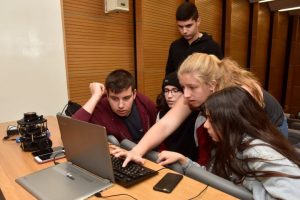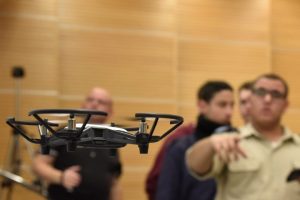Intelligent Robotics: 21st Century Teaching of Science and Engineering
The Technion Faculty of Education in Science and Technology recently held the closing event of “Intelligent Robotics” in which all participants gathered at Technion City to present their projects.
Among the skills exemplified by the robots were autonomous mapping and navigation, communication using IoT (Internet of Things); and drones that could photograph the terrain from the air and transfer data through a ground station to a ground-based robot that designated to deal with detected problems.
The final event took place at the Technion with the participation of high school students, parents and mentors from the Technion and Massachusetts Institute of Technology.

MIT student Keila Holman with ORT Technikum-Givatayim pupils
The “Intelligent Robotics” project was born in 2017 at the initiative of the Center for Robotics and Digital Technology Education as a collaboration between the Technion and MIT. The CRDTE conducts research focusing on technological learning environments, experiential learning, modeling and analogy, educational robotics, human-robot interaction, museum education, learning mathematics with applications and in cultural context. One of its activities is to actively engage high school students with the field of intelligent autonomous systems.
“We want to provide school students in Israel with real engineering skills that are relevant to the new world of employment, skills that not yet taught in regular school programs,” said CRDTE Head Prof. Igor Verner, who explains how he was inspired by the MIT Beaver Works Summer Institute program in which he participated as a researcher. “We see this project as an innovative model for the interdisciplinary specialization that combines computer science, electronics and mechanics. In the coming summer, we will present the project at a closing ceremony of the robotics program at MIT.”
In collaboration with the global company PTC and with the involvement of students from MIT, the CRDTE has developed an environment for the experiential learning of advanced technologies. “You have built a truly amazing lab that enables you to experience an environment that is very similar to the real world,” said PTC Israel CEO Ziv Belfer at the event: “The world has become autonomous, connected and controlled, and here, you experience all this.”
This year, following the success of last year’s pilot, Israel’s Education Ministry and ORT Israel also became involved. 66 students from five schools participated: Hugim in Haifa; ORT Technikum in Givatayim; ORT Gan Yavne; Bosmat Haifa; and the Israel Air Force Technical School in Haifa.

Presentation of a drone robot on a photography mission
The project’s activities were coordinated by Dr. Dan Cooperman of the Technion and Gadi Herman of ORT Israel. At the end of 2018, the pupils underwent a preparatory course in which they learned robotics; programming in Python; IoT; working principles in Linux; and the Robot Operating System. In January 2019, three MIT students who came to Israel as part of the MISTI Global Teaching Labs program joined the teaching staff and taught the students robot programming in ROS.
“In our age, interdisciplinary cooperation is needed to develop complex things,” said Technion Senior Vice President Prof. Adam Schwartz, “and this is what we do here at the Technion – learning the most complicated things to build together complex, successful and useful technologies – to benefit mankind.”
The project’s activities were coordinated by Dr. Dan Cuperman of the Technion and Gadi Herman of ORT Israel. At the end of 2018, the students underwent a preparatory course in which they learned robotics, programming in Python, IoT, working principles in Linux, and the Robot Operating System. In January 2019, three MIT students who came to Israel as part of the MISTI Global Teaching Labs program joined the teaching staff and taught the students robot programming in ROS.
“In our age, interdisciplinary cooperation is needed to develop complex things,” said Technion Senior Vice President Prof. Adam Schwartz, “and this is what we do here at the Technion – learning the most complicated things to build together complex, successful and useful technologies – to benefit mankind.”
“The best path to social, economic and employment advancement is to study,” said Prof. Yehudit (Judy) Dori, Dean of the Faculty Education in Science and Technology. “That’s why we’re cooperating with the educational system. We want the best students here at the Technion.”
“The project nurtures the 21st century students’ performance and exposes them to new fields,” said Milena Meron, who is Principal of the Hugim High School, from where students are participating in the project for the second time.
“I was so impressed by how motivated and enthusiastic the students were to learn about robotics and autonomous systems,” said Ariel Levy, an MIT student who taught in the project. “The students quickly picked up the necessary skills for the project. I was so proud to see everyone’s presentation at the end! I had so much fun teaching in Israel and I hope I can return soon.” ”
The parents of Noya, a student at ORT, wrote: “We want to thank everyone who made this project happen. Thank you for the meaningful, challenging and extraordinary education that made our daughter tell us each day with great excitement about the project’s progress. We sensed the desire to learn, the commitment and the responsibility that you gave her. There is no doubt that it is a special experience. We’re already waiting for the next project!”


